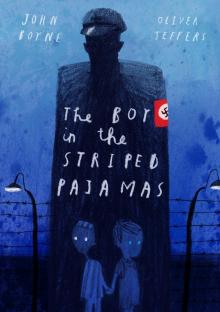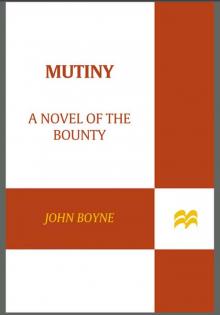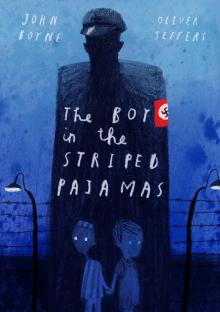- Home
- John Boyne
Mutiny: A Novel of the Bounty Page 16
Mutiny: A Novel of the Bounty Read online
Page 16
Quintal was taken forth then, the shirt stripped from his back as he was tied to a deck-grating before all the men, his arms and legs stretched out on either side. We watched, each one of us, in horror and excitement, for here again was a break to our daily routine, and as no such incident had taken place over the previous few months we were each, in our shame and blood thirst, eager to see what would happen next.
The cat-o’-nine-tails – a piece of rope, about eighteen inches in length, with nine lengths of cord emerging from its tip, and three knots tied in each – did not look quite so fearsome a creature to me as I had expected and, indeed, for the first couple of lashes Quintal gave off nothing but a quiet yelp, such as one might do if one was kicked in one’s sleep by an unknown assailant. But by the third, he was grimacing. By the fourth, he let out a shout. And by the fifth, each lash was followed by a cry of pain that made my stomach ill inside, even though I did not like the man. His back erupted in red lines from the thrashing, and before the numbers reached double figures blood was spurting from them. We counted the lashes in our heads, each one of us, and at thirteen, fourteen, fifteen, I felt sure the captain would call a halt, for Quintal appeared to have fallen unconscious beneath them – his body had gone lax, his back was a map of pain and weeping sores – but word came there none and the boatswain continued to the assigned twenty-four, before turning to look at Captain Bligh and raising an eyebrow.
‘Take him down,’ said the captain then, and the straps were immediately loosened and Quintal slumped to the deck. He was immediately picked up by four of his fellows, for it was common practice to lash a man and then send him to the surgeon to have his wounds tended – the great irony of the sea, I thought – but there was life in him yet, for as he was dragged past me, leaving a trail of blood in his wake, he looked up at me and barked. I swear it to you, he barked like the dog he claimed to be. It made me jump too, the donkey.
‘Wash down the decks, please,’ said the captain, turning away now. ‘And disinfect them with vinegar. All officers, please to report to my cabin immediately.’
He went down the steps then, followed by Mr Christian, Mr Heywood, Mr Fryer and Mr Elphinstone. I followed too, in case they wanted tea. The pails came out as I descended and I looked back towards the men, who were grumbling among themselves at the damage inflicted on one of their number, ignoring the fact that he was a thief and a foul-mouth.
‘It had to happen sooner or later, sir,’ Mr Christian was saying as they gathered in the captain’s cabin and I stationed myself outside to prevent the intrusion of others and, aye, to listen to their conversation myself. I’m ashamed of naught. ‘Don’t be disheartened. It does the men good to see a little discipline meted out from time to time. Reminds them of their place.’
‘I’m not disappointed, Mr Christian,’ said the captain, whose voice was still bubbling over with anger. ‘And I’m not afraid to let them know who is in charge of this here vessel and who is not. Do you doubt that, sir?’
‘No, Captain,’ said Mr Christian. ‘No, of course not. I merely meant that—’
‘And you, Mr Fryer,’ continued the rant as he stepped closer to the ship’s master, ‘you took great pleasure in the scene that just played out before us, I’d measure?’
‘I, sir?’ he asked in astonishment. ‘Why should I—?’
‘You logged the incident, did you not, sir? Two days ago, if I’m not mistaken, sir?’
‘Yes, I informed you at the time and you quite correctly stated that punishment would have to wait until we were in calmer waters—’
‘Quite correct, was I, Mr Fryer? Quite correct? I’m so happy that I have your approval, sir. Does the captain of a ship need approval from its master? Is that a new regulation of naval law of which I have not been appraised?’
‘I meant no insult, sir.’
‘Damn you, man,’ roared the captain then, so loudly that I swear the hesitant sea-birds must have scattered above our heads at the sound of it. ‘Damn you to hell and back! You had two full days to tell me the cause of the infraction and what did you do, you mentioned something about a stolen cheese and an act of insubordination—’
‘Sir, you never asked me—’
‘Don’t speak to me while I’m talking, sir! Don’t speak to me!’ He stepped so close to Mr Fryer now that he could have kissed him in a moment had he felt an inclination to do so, but his words were as close to screams as I’d ever heard emerge from this cabin. ‘Damn your boots, sir, you’ll not speak when a superior officer is addressing you! Do you hear me, sir? Do you?’
‘Yes, Captain,’ said Mr Fryer quietly.
‘You had two full days before now, Mr Fryer. Two full days to tell me the level of the insult, and when do I hear it first? On deck. Before the punishment. In front of all the officers and all the men. You don’t think you might have mentioned it before then?’
Mr Fryer hesitated, no doubt wanting to ensure that the captain had finished his tirade before offering an answer or explanation.
‘I tried to tell you yesterday morning, sir,’ insisted Mr Fryer slowly and carefully. ‘I said he had made a lewd remark that should not be repeated in front of the men and you—’
‘You said no such a thing, sir!’ shouted the captain, storming around the cabin now, tossing papers hither and thither for me to tidy later. ‘You said no such a thing!’
‘I did, Captain,’ replied Mr Fryer firmly. ‘I stood in this very spot and—’
‘Are you calling me a liar now, Mr Fryer, is that it?’ he asked, stepping over to him again. ‘Speak clearly, now. Are you calling me a liar? Mr Christian, you’ll witness the remark.’
There was a long silence. I wanted nothing more than to poke my head around the door to get a better look at Mr Fryer’s face, or for that matter the faces of the other officers, for they had never been subjected to such a tirade in all their months at sea so far, but I feared that if I did so the captain, in his fury, would lop it off.
‘I must be mistaken, sir,’ said Mr Fryer finally.
‘Aye! Mistaken!’ shouted the captain, vindicated. ‘You heard him, gentlemen, he was mistaken. I wonder that I don’t have you flogged as well.’
‘Sir,’ said Mr Elphinstone, unwisely entering into the conversation. ‘Mr Fryer is a warrant officer. He can’t be flogged.’
‘Quiet, Mr Elphinstone,’ said Mr Christian immediately, who at least had the sense to know that the captain was making an idle remark and not a threat.
The interruption of the two men seemed to catch the captain off guard, for he looked around then, searching for his anger again, before looking towards the door, where I was too slow to jump out of his sightline and he caught me a-hovering. ‘Turnstile!’ he roared and the heart crossed sideways in me, for he was in no condition to be reasoned with and if he wanted another flogging, well, there was only one of us present who was not warranted. ‘Get your blasted skinny rump in here this instant!’
I stepped carefully inside, anxious to keep my distance from all. I looked from man to man. Mr Fryer was pale, but he did not seem angry. Mr Christian and Mr Elphinstone looked anxious, while young Mr Heywood, the scut, looked as if he was enjoying the drama enormously and hadn’t had as much fun since he’d last popped a pimple.
‘Captain?’ said I, ready to apologize for anything that needed apologizing for, regardless of whether I was guilty or not.
‘Turnstile, you’re to draw up a note for me,’ said the captain. ‘Dated today. Fletcher Christian promoted to lieutenant and ship’s master. John Fryer to retain his standing and assist Mr Christian in all duties as might be required of him.’
‘Sir, I must protest—’ began Mr Fryer, but the captain spun around, his face red with fury.
‘Protest, do you?’ he shouted. ‘Protest at me? Damn your boots, you landed . . . Damn your boots! Insult me and my kin on the deck of the ship and think that I’ll stand for the treason, do you? At school, maybe, sir, when the likes of you were in charge. As a sailor, aye, as was m
y duty. But not here, sir! Not on the Bounty! I am captain, no matter where I come from, and you are my subordinate, no matter your father’s title. And you’ll take my orders, sir! Won’t you, sir? You’ll do as I say, sir, you understand me?’
Mr Fryer glared at him and I swear his nostrils were flaring like a horse in heat.
‘Do you understand me, sir?’ roared the captain again, and finally Mr Fryer nodded his head slowly.
‘You are, as you say, Captain,’ he said.
‘Aye, I am,’ said Mr Bligh, tugging at his jacket and trying to calm himself down. ‘Captain of all, from officers to midshipmen to cabin boys, and none to forget it either. Mr Christian, you’re happy with the promotion?’
‘Aye, sir,’ said Mr Christian, and I could see that he was trying hard not to smile too much or puff his chest out any further than it needed to go. And as for his sidekick, the warted toady, he looked ready to explode with pleasure.
‘Good, then you’re dismissed,’ said the captain. ‘Get out, the whole blasted lot of you.’
The officers marched out of the cabin, one by one, but I hesitated and was left alone there with the captain, who sat down in his chair out of sight of the corridor before putting his head in his hands for a moment and then looking up at me. ‘Turnstile,’ he said quietly, looking so sad and devastated that my heart broke for him, despite his anger. ‘You may go too.’
‘Some tea, sir?’ says I. ‘Or a cordial? A glass of brandy, perhaps?’
‘You may go,’ he repeated quietly, and I hesitated for only a moment before nodding my head and leaving.
One final observation. In the corridor as I emerged, the triumvirate of Mr Christian, Mr Heywood and Mr Fryer standing there, two facing one, and Mr Christian’s hand on Mr Fryer’s arm.
‘Don’t, Fletcher,’ said he sharply. ‘You got what you wanted.’
‘John . . .’began Mr Christian and the master laughed.
‘Oh, it’s “John” now, is it?’ he asked. ‘An hour ago it was “sir”.’
They stared at each other and finally Mr Christian shrugged his shoulders and walked away, followed, of course, by the scut, who deserves no name.
Mr Fryer turned round, caught my eye, stared at me for a moment and then turned and entered his tiny cabin, closing the door quietly behind him.
18
LOOKING BACK, THERE WERE MANY difficult times during that voyage on the Bounty – days when we were hungry, days when we were exhausted, days when the expanse of water around us made us sea-blind or half-crazed with the deliriums – but none were quite so terrible as the twenty-five days that we spent attempting to round the Horn; almost a month wasted from each of our lives as we fought against nature, foolish creatures that we were, and were allowed to progress no further than a few hopeless leagues in the attempt.
The ship had changed a little since the twin dramas of Matthew Quintal’s flogging and Mr Christian’s promotion. The men worked harder and were quieter with it and I believed that perhaps the new lieutenant was right when he said that the men liked to see a little discipline meted out from time to time; it kept them lively. The officers appeared to be divided into two camps, with the captain, Mr Christian and Mr Heywood, the pustulant prick, on one side and Mr Fryer on the other, with Mr Elphinstone stuck in the middle trying to keep peace between them all. By the nature of my position, I spent more time among them than any other man or lad aboard, but I kept my head down, as was my habit, and tried to get on with my work.
The sea changed suddenly and dramatically as we sailed through the 50th parallel, as if it had been keeping a wary eye on our small craft for weeks and had decided that enough was enough, we were brave fellows but it was time for us to be sent back whence we had come. And so the winds blew until my eyes could scarcely keep open when on deck, so forceful were they in sweeping each of us from our feet. And the rain fell until it turned into sleet and landed upon our heads like stones from the heavens or one of the plagues of ancient Egypt. Then the tides grew so heavy that they would roar and rage and sink deep before rising up before us, sweeping across our bows, roaring like a roused lion, the vicious mouth ready to swallow each and every one of us should we lose our footing for even a moment, although to my surprise she claimed no victims yet. There was no time for personal dramas or skirmishes on board now as each man did all he could to keep us afloat and alive. Even the dancing was temporarily suspended, as the notion of us turning jigs or hornpipes while the hurricanoes spouted around us was enough to make madmen of us all. At times it felt as if there was to be no end to the tempest and my duties were extended to include keeping the area below decks free of water, from the great cabin where the pots were stored, to my own bunk and the doors leading to the captain’s, Mr Fryer’s and the other officers’ cabins. And blast me if this wasn’t a more difficult task than it sounded, as every time an officer appeared before me he was shaking off his greatcoat and the deck was sodden again with what seemed like half the ocean’s capacity. Time and again I ran up the steps to batten down the hatch, only to find it reopened by the time I returned to my post. The sound of the wind was like a whistling in my ears that never failed and it gave me a sick headache, and as the days passed the first suggestion was made – by that unlucky fellow Mr Fryer – that the Horn was impassable.
‘Impassable, Mr Fryer?’ asked the captain in a thoughtful voice as they sat with Mr Christian one evening, a week, perhaps ten days, into this dreadful weather. ‘Did Mr Hicks say as much to Captain Cook when they attempted to round the Horn?’
‘No, sir,’ he replied, trying to keep his voice reasonable so as not to arouse Mr Bligh’s terrible temper. ‘But it was a different time of year and, with respect, Zachary Hicks was cautious about their prospects at the time. I see no end to these storms. It’s been weeks now since they began.’
‘What of the sails?’ asked the captain. ‘What condition are they in?’
‘They’re holding,’ admitted the ship’s master. ‘For now anyway. I dread to think what would happen should one of our masts crack in two. We would be lost, I fear.’
The captain nodded and sipped his tea. Relations between the two men had become more civil since the weather had come upon us. For my part, I had begun to respect Mr Fryer, for he had taken the promotion of Mr Christian without further complaint and appeared to have nothing but the best interests of the ship and our mission at heart. His comments no longer seemed to irk the captain as much as they had before, but then the captain was not in an unpleasant humour, for I rather fancied that there was nothing he enjoyed more than a challenge such as the one we faced.
‘The winds may blow and the sea may storm but we shall scud on,’ he said finally, placing a hand firmly down on the table before him as if to suggest that that was an end to the matter. ‘We shall scud on, my fine fellows, and emerge unblemished on the other side of the beast, like Captain Cook did before us, and before any of you have a chance to thank the Saviour for the blessing of it, we’ll be sailing north by northwest towards Otaheite and opening our telescopes to spy land.’
No one said anything for a moment. Surely he was a confident man, our brawny captain. And a foolish one at times.
‘There is the issue of the men, sir,’ suggested Mr Christian finally.
‘The men?’ asked the captain, looking across at him. ‘What of the men? They work hard, don’t they?’
‘Valiantly,’ he replied. ‘They are English sailors, every one. But their hopes are flagging. They don’t see how we can get through it. We’ve made such little progress over the past week and now several of the men are down with colds and the tremors.’
‘They don’t have to see, Mr Christian,’ replied the captain testily. ‘They have to obey.’
‘They’re afeared, sir,’ said Mr Heywood then, sitting forward, and I swear it was the first time I’d ever heard him offer an opinion at a meeting like this; I suspect it was the first time he ever had, for the other men turned to look at him, each one, and his face took
on the reddenings even worse than usual, and I feared his pimples would have a violent eruption and kill him altogether, which would have been no poor thing.
‘Are they?’ asked the captain quietly, stroking his chin for a moment and considering it. ‘Are they indeed? Well, they have nothing to fear, for I shall deliver them from this storm and they shall thank me for it and be proud of their own actions. Still and all, let us increase their rations for now,’ he concluded. ‘An extra portion of soup and rum for every man once a day. That will give them energy, will it not?’
‘Very good sir,’ said Mr Christian.
An uneasy peace rested between the officers and captain and I must admit that my own relationship with Mr Christian had grown increasingly tense. Many was the occasion that I found him waiting for the captain in his cabin – which no officer was supposed to do – and helping himself to Mr Bligh’s brandy as he sat there. Whenever I entered and found him thus, he would raise his glass to me defiantly and toast my good health, and what could I do only thank him for the honour of it and be on my way.
A few nights later I found myself on deck in near darkness, when the raging seas had calmed slightly and the moon overhead, which was full, appeared in the sky like a giant florin which I could pocket as easily as any I ever had before. Some instinct took me to the side of the boat and I looked up towards it, closing one eye and reaching my hand out, capturing the sphere between thumb and forefinger, and I must have looked a fright to anyone who observed me, but the men were too busy keeping the ship afloat and those who were not on duty were already in their bunks, hoping for an hour or two’s sleep, so my actions were of concern to no man. I closed my eyes then for a moment and imagined that the noise had faded away and all was peace around me, all was solitude and happiness on this strange moving platform that had become my home.

 Beneath the Earth
Beneath the Earth The Boy in the Striped Pajamas
The Boy in the Striped Pajamas Next of Kin
Next of Kin The House of Special Purpose
The House of Special Purpose A Ladder to the Sky
A Ladder to the Sky A History of Loneliness
A History of Loneliness The Heart's Invisible Furies
The Heart's Invisible Furies The Boy at the Top of the Mountain
The Boy at the Top of the Mountain Stay Where You Are and Then Leave
Stay Where You Are and Then Leave Crippen: A Novel of Murder
Crippen: A Novel of Murder The Absolutist
The Absolutist Mutiny: A Novel of the Bounty
Mutiny: A Novel of the Bounty A Traveler at the Gates of Wisdom
A Traveler at the Gates of Wisdom The Congress of Rough Riders
The Congress of Rough Riders The Thief of Time
The Thief of Time The Boy in the Striped Pajamas (Deluxe Illustrated Edition)
The Boy in the Striped Pajamas (Deluxe Illustrated Edition) The Terrible Thing That Happened to Barnaby Brocket
The Terrible Thing That Happened to Barnaby Brocket The Boy In The Striped Pyjamas
The Boy In The Striped Pyjamas Crippen
Crippen